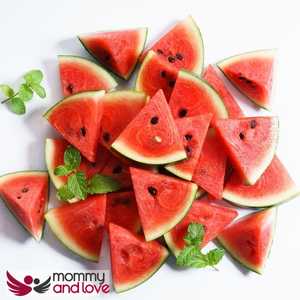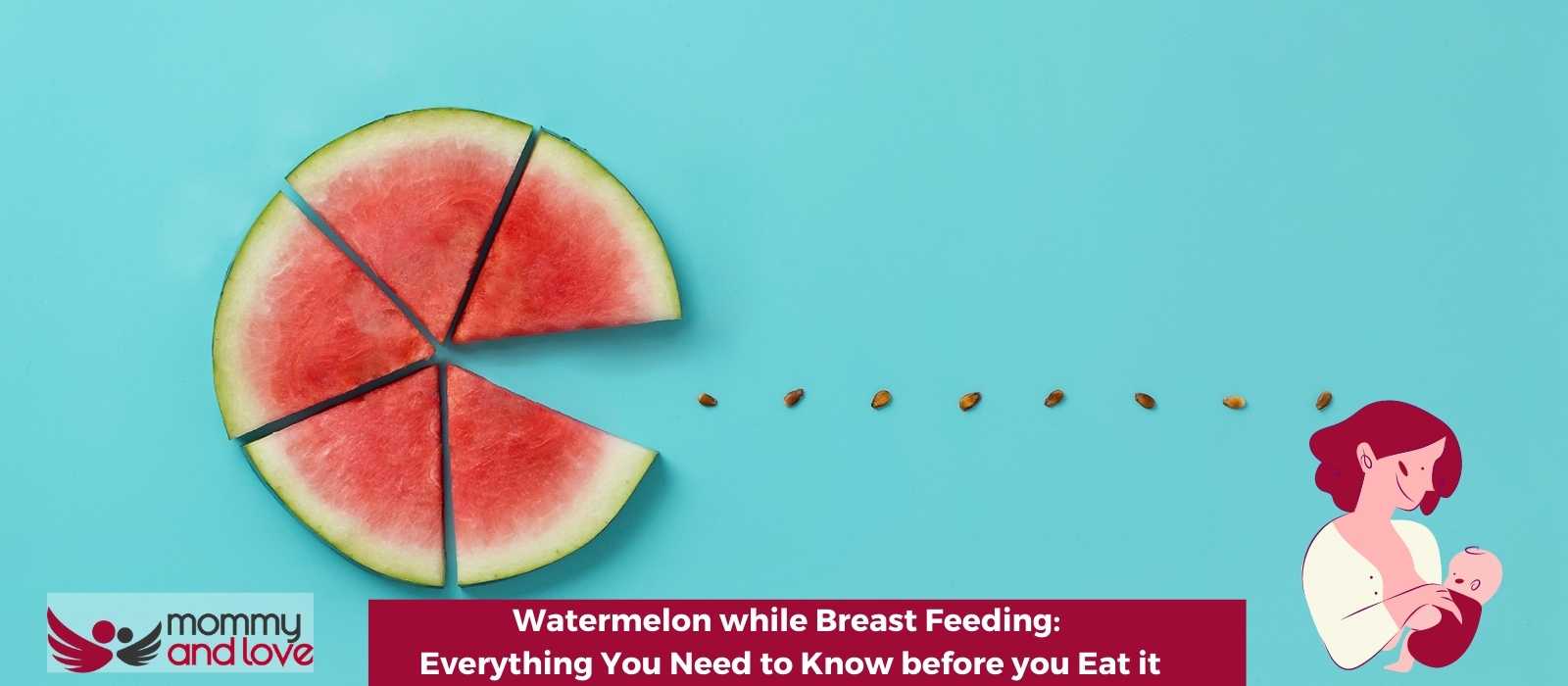Watermelon is a popular summertime fruit that is enjoyed by people of all ages. But can you eat watermelon while breastfeeding?
Here is some information on watermelon and breastfeeding to help you make the best decision for you and your baby.
Is Watermelon Healthy?

Watermelons are not only delicious and refreshing summer fruits but they’re also packed with nutrients that can be beneficial for both the mother and baby.
Watermelon is a rich source of electrolytes, which can help to maintain proper fluid and electrolyte balance in the body. It’s also a good source of vitamins C and A, as well as other important antioxidants for breastfeeding moms.
Eating a healthy diet is important for all mothers, but it’s especially important for those who are breastfeeding. Getting enough fluid and electrolytes can help to prevent dehydration and keep a healthy water balance, which helps avoid fatigue and other problems.
Eating a diet that includes plenty of fruits and vegetables like watermelon can help to ensure that you’re getting the nutrients you need.
Folate
This fruit is also an excellent source of folate, which is important for the rapid development of the baby during early childhood. It is also important for the mother’s health, as it helps to reduce the risk of certain cancers.
Folate is often recommended for pregnant women during pregnancy as it helps to prevent birth defects and promotes healthy cell growth.
What Are the Health Concerns About Eating Watermelons While Breastfeeding?
There are a few health concerns to keep in mind when consuming watermelons while breastfeeding.
First, watermelons are one of the strongest food allergens. If you have a history of allergies, or if your baby has a history of allergies, it’s best to avoid eating watermelons while breastfeeding. Most babies are not allergic to watermelons but it is still important to err on the side of caution.
The trace elements in watermelons can have an effect on babies while breastfeeding. Even a fraction of these elements in food can cause problems for breastfed babies. For this reason, it is important to carefully monitor your intake of watermelons if you are breastfeeding.
Additionally, excessive consumption of watermelons can lead to pancreatic diseases. So eat watermelons in moderation or in small portions.
Can Watermelon Help Increase Breast Milk Supply?
Watermelon is a juicy, delicious fruit that is perfect for summer. But did you know that this watery summer fruit can also help breastfeeding moms produce milk at optimal levels?
Watermelon is packed with vitamin C as well as potassium and magnesium. These nutrients are all important for a mother’s health, and they can affect how much milk breastfeeding mothers can produce. Vitamin C in particular is important for a health immune system.
So how much watermelon should a breastfeeding mom eat? There is no definitive answer, but experts recommend eating two to three cups of watermelon per day.
Watermelon is more than 90% water, so it’s very refreshing and low in calories.
How to Make Sure You Have Enough Milk for Breastfeeding?

Any new mom is worried that she won’t have enough breast milk to provide for her child. While it’s true that some moms do have difficulty producing milk, there are a few things you can do to make sure you have enough milk supply.
First, be sure to eat a well-balanced diet. You need essential nutrients like protein, fat, carbohydrates, and minerals to produce more milk. Not only that, but you will also have enough energy to look after your little one as well as lose weight in a healthy way.
Second, drink plenty of fluids. Water is essential for milk production, so be sure to drink eight glasses a day. You can also try herbal teas like fenugreek or blessed thistle, which are thought to increase milk production.
Finally, make sure you’re getting enough rest. When you’re well-rested, your body is better able to produce milk. So take the time to put your feet up and relax whenever you can.
If you’re struggling to produce enough breastmilk, consider adding these foods to your diet- they’re perfect foods to eat after giving birth:
- Green papaya is not only a delicious fruit but it has also been traditionally used to help increase breastmilk production. The green papaya is rich in antioxidants and phytonutrients, which are believed to be the active ingredients that help stimulate milk production.
- Greek yogurt is also a good source of calcium and protein, both of which are important for breastmilk production.
- Iron is important for both mother and baby during lactation. It supports breast milk production as well as helps the baby’s brain development and also prevents deficiency anemia in the mother. While you can get it from supplements, it’s best to get it from iron-rich foods such as fruits, vegetables and meat. If you eat fish, it’s best to avoid fishes that are high in mercury such as king mackerel, swordfish and shark.
Overall, the female needs to consume a lot of beneficial components, vitamins and minerals during lactation. This is one of the reasons why you should be making healthy choices with what you consume. After all, you’re not only looking after the well-being of your body but also the healthy state of your child.
Also, the benefits aren’t just for the breastfeeding mother- if your little one is just starting to eat solids, watermelon is a handy and healthy weaning baby food.
Conclusion
Watermelons can be a good source of vitamin C and other nutrients to help new moms who are breastfeeding to have enough breastmilk supply. However, these fruits also come with risks, albeit very small ones. So before introducing such a product to your diet, make sure to talk to your doctor.
It’s important for all new moms who are planning on breastfeeding their newborns to eat nutritious foods which include fruits, whole grains and veggies that can help them produce the milk that their baby needs. These foods are great foods to eat after giving birth.
Plus, fruits, vegetables and nutritious foods will help you feel your best and have the energy you need to care for your new little one.

This article was written by Sandra Baker – full time writer and the mother of four amazing kids (including twins!)
She’s also a breastfeeding counselor and has spent years helping new parents learn how to care for their children. When she’s not writing or caring for her children, Sandra likes to spend time reading and taking walks with her husband.




